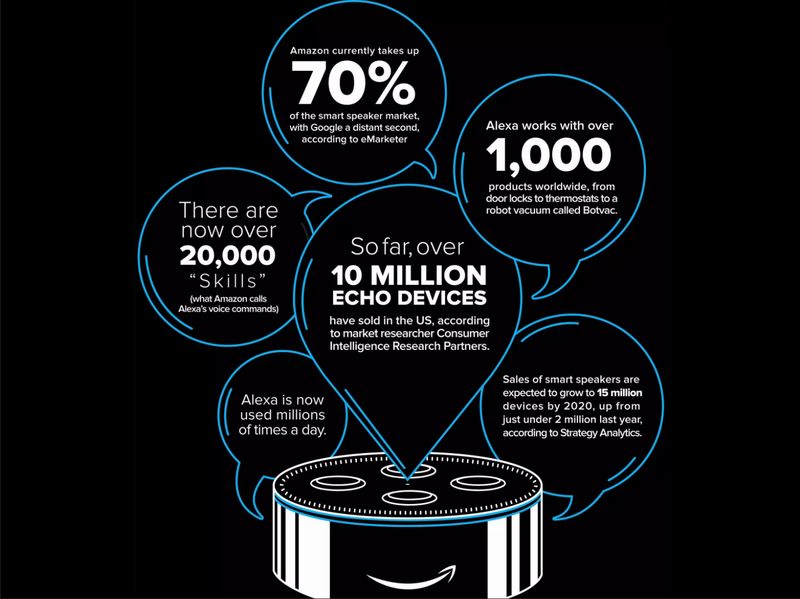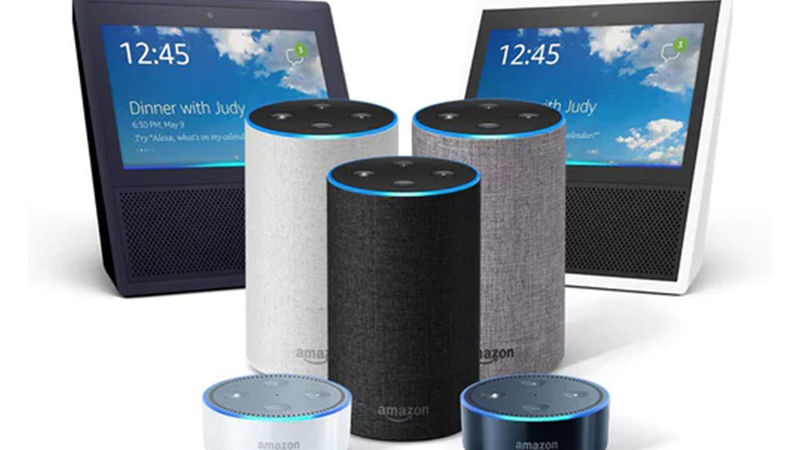Why We May Soon Be Driving and Living in Alexa’s World Unless Google or Apple’s will say I do!

Amazon’s voice assistant has wormed herself into our lives, and into much of the culture beyond,
When Amazon unveiled Alexa three and a half years ago, it was roundly jeered. Now, against all expectations, even though she’s sometimes unpredictable and unpolished, Alexa is here to stay. And that may be underplaying it; people in tech have recently begun to talk about Alexa as being more than just part of a hit gadget.
- “We had a spectacular holiday,” Dave Limp, Amazon’s senior vice president of devices and services, said when I called last month to chat about the assistant’s future.
- Amazon is famously cagey about sales numbers, but Mr. Limp braved a slight disclosure: “We’ve said we’ve sold tens of millions of Alexa-enabled devices, but I can assure you that last year we also sold tens of millions of just Echo devices. At that scale, it’s safe to now call this a category.”
- At least 50 devices are now powered by Alexa, and more keep coming. They include dozens of Echo-like smart speakers, home thermostats, light fixtures, dashboard cameras, smartphones, headphones, a smoke alarm and a very strange robot.
Alexa is spreading so quickly that even Amazon can’t keep track of it. Mr. Limp said that as he wandered the floor at the CES electronics trade show in Las Vegas this year, even he was surprised by the number of different Alexa devices.
Amazon’s Alexa voice assistant is part of Echo smart speakers like this one, but it is also a piece of software that other device makers can put into their products.
- But there are also advantages to Alexa’s model for ubiquity. Imagine if you could gain access to your smartphone on just about any screen you encountered. Move from your phone to your TV to your laptop to your car, and wherever you went, you’d find all your apps, contacts and data just there, accessible through the same interface.
- That model isn’t really possible for phones. But because Alexa runs in the cloud, it allows for a wondrously device-agnostic experience. Alexa on my Echo is the same as Alexa on my TV is the same as Alexa on my Sonos speaker.
- And it’s the same even on devices not in your home. Ford — the first of several carmakers to offer Alexa integration in its vehicles — lent me an F-150 pickup outfitted with Alexa. The experience was joyously boring: I called up Alexa while barreling down the highway, and although she was slower to respond than at home, she worked just the same. She knew my musical tastes, my shopping list, the apps and smart-home services I had installed, and just about everything else.
- It was the best showcase of the possibilities of always-on voice computing. In the future, wherever you go, you can expect to talk to a computer that knows you, one that can get stuff done for you without any hassle.
There’s a lot of money in the voice game. For Amazon, Alexa’s rise could lead to billions of dollars in additional sales to its store, Mark Mahaney, an analyst at RBC Capital Markets, predicted recently. Amazon is thus not the only company chasing the dream of everywhere voice computing.
Google, which is alive to the worry that Alexa will outpace it in the assistant game, is also offering its Google Assistant to other device makers. Though Amazon remains the leader in the business, there’s some evidence that Google’s devices gained market share over the holidays. (Apple, which just released a $349 smart speaker, HomePod, does not seem to be aiming for voice ubiquity.)
The emerging platform war between Amazon and Google could lead to fallout for users. But their platforms can also play together. Amazon’s and Google’s relationships with third-party companies are nonexclusive, which means that hardware makers are free to add both Alexa and Google Assistant to their products. Sonos, for instance, now integrates with Alexa, and is planning to add Google Assistant soon.
This is not the best outcome for the future; it would be better for all of us if the next computing platform didn’t come from one of the current tech giants, and if start-ups didn’t have to rely on Amazon or Google for this key piece of tech.
A Cornell University study called “Alexa is my new BFF” proves the point. Researchers analyzed 587 customer reviews of the Amazon Echo smart speaker, powered by the Alexa voice assistant. They found that the more we personify the Pringles-can-shaped gizmo — using words like “Alexa” and “her” instead of “Echo” and “it” — the more satisfied we are with the device (I mean “her”).

Sitting in a sunlit conference room in Seattle last month on the eighth floor of Amazon’s new black-glass highrise called Day 1, I mention the report to Heather Zorn, director of customer experience and engagement for the Alexa team. She isn’t surprised by the findings; she’s been reading the reviews, too.
“We’ve really done more in the personality space based off of customer demand,” says Zorn, a friendly, bookish woman with a quirky streak. “We saw some customers sort of leaning in and wanting more of a jokes experience, or wanting more Easter eggs or wanting a response when you said ‘Alexa, I love you.’”
must also read